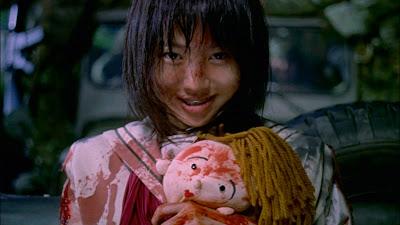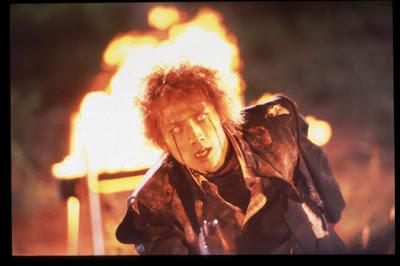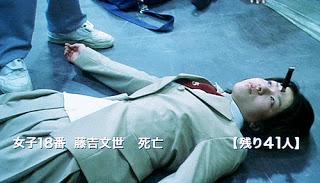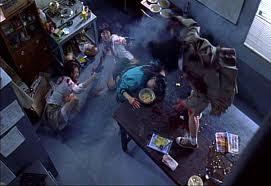 So, I watched Battle Royale last night; on a whim mostly as I sifted through my movie list and realized just how long this praised flick has remained there. Besides, my friend had brought the DVD back from her house after the winter break, so why not? Often compared to The Hunger Games, this film most closely resembles The Raid: Redemption in its brutality and shock factor. Much like Raid, I enjoyed and squirmed through nearly every single minute of this film.
So, I watched Battle Royale last night; on a whim mostly as I sifted through my movie list and realized just how long this praised flick has remained there. Besides, my friend had brought the DVD back from her house after the winter break, so why not? Often compared to The Hunger Games, this film most closely resembles The Raid: Redemption in its brutality and shock factor. Much like Raid, I enjoyed and squirmed through nearly every single minute of this film.Spoilers Ahead:
 Adapted from the 1999 novel of the same name by Koushun Takami, Battle Royale is about a class of students on a bus driving to their field trip; they are chloroformed and wake up in a class setting. There, they are informed that they have been chosen for this film's Battle Royale by none other than their 7th grade teacher, Kitano. The film features several flashbacks throughout that procure necessary back story. In 7th grade, one of the students (Kuninobu) stabbed Kitano and then decided to leave school permanently. Kitano decided to resign shortly afterwards. Kuninobu was meanwhile convinced to return to school by his best friends Shuya and Noriko. Kitano informs the students that the Battle Royale is a law/program passed by the Japanese government to reform the country after thousands of students walked out of school. The students are placed on an island where they are required to kill each other until only one remains. However, they must do so within a 3-day period or the collars placed around their necks will detonate; in such a case, there would be no winner. Every 6 hours, Kitano and his army of soldiers on the island will broadcast news of who died, how many students are left, how much time remains and which areas of the island have been declared danger zones. If a student lingers in a danger zone, his or her collar will automatically detonate. Two students are killed by Kitano before they have a chance to receive a backpack (which contains certain survival equipments and a different weapon per student) and be sent outside onto the island; one of them is none other than Kuninobu. Before all of the students are outside, some already start killing each other. Others decide to commit suicide together. Shuya and Noriko decide to protect each other and refuse to participate in the bloodshed. Nonetheless, it seems to follow them wherever they go, sometimes through misunderstanding and other times by some of the students' sheer blood-thirst.
Adapted from the 1999 novel of the same name by Koushun Takami, Battle Royale is about a class of students on a bus driving to their field trip; they are chloroformed and wake up in a class setting. There, they are informed that they have been chosen for this film's Battle Royale by none other than their 7th grade teacher, Kitano. The film features several flashbacks throughout that procure necessary back story. In 7th grade, one of the students (Kuninobu) stabbed Kitano and then decided to leave school permanently. Kitano decided to resign shortly afterwards. Kuninobu was meanwhile convinced to return to school by his best friends Shuya and Noriko. Kitano informs the students that the Battle Royale is a law/program passed by the Japanese government to reform the country after thousands of students walked out of school. The students are placed on an island where they are required to kill each other until only one remains. However, they must do so within a 3-day period or the collars placed around their necks will detonate; in such a case, there would be no winner. Every 6 hours, Kitano and his army of soldiers on the island will broadcast news of who died, how many students are left, how much time remains and which areas of the island have been declared danger zones. If a student lingers in a danger zone, his or her collar will automatically detonate. Two students are killed by Kitano before they have a chance to receive a backpack (which contains certain survival equipments and a different weapon per student) and be sent outside onto the island; one of them is none other than Kuninobu. Before all of the students are outside, some already start killing each other. Others decide to commit suicide together. Shuya and Noriko decide to protect each other and refuse to participate in the bloodshed. Nonetheless, it seems to follow them wherever they go, sometimes through misunderstanding and other times by some of the students' sheer blood-thirst.
Homegirl was whispering during Kitano's presentation. She had to go.
As far as acting goes, The Hunger Games is superior than Battle Royale. The cinematography and sountrack of the former are also better. Yet, I would give both films the same rating because, while they do share the same themes (government oppression, survival of the fittest, yadda, yadda), they go in completely different directions. Battle Royale does not attempt to go in depth into exploring its most political themes. It is most interested in showcasing the interpersonal relationships between the characters and their subsequent deterioration in the face of adversity. It accomplishes this through carnage and brilliant death sequences. The acting is not necessary to carry the film; the visuals and the soundtrack do aid in making the film as successful as it is, but they are secondary to the plot. The story and one's subsequent analysis of their ability to relate to it are the charms of this film. What would I do if I were on this island? Would I commit suicide in a bid to remain clean or would I revert to barbarism? Would I actually help Shuya and Noriko's whiny, pathetic asses survive? What I would I do if my weapon was a friggin' binocular?! Rarely do action or death sequences pose such profound questions.The film perfectly demonstrates how survival instincts may perhaps be stronger than friendship. The students' sudden awareness of their mortality forces them to shun not only their sense of ethics, but also the stereotypes/roles placed upon them by society. Three nerds nearly survive till the end of the game. An upper middle class student abandons his learned morals and brandishes his crossbow. One of the most savage characters and my personal favorite, Mitsuko, is a beautiful girl who uses her charms to ruthlessly deceit and kill.
Ludovico Rating:

3.5/5. I would definitely watch this film again. It's already one of my favorites.
